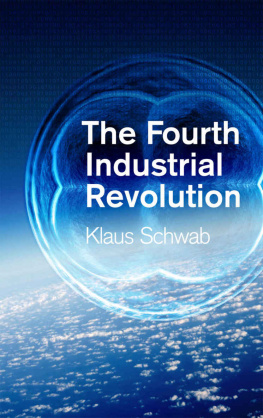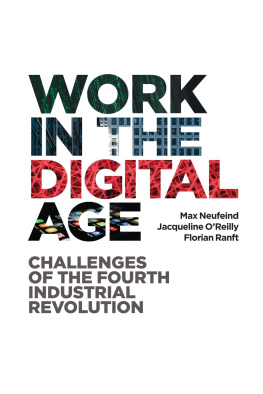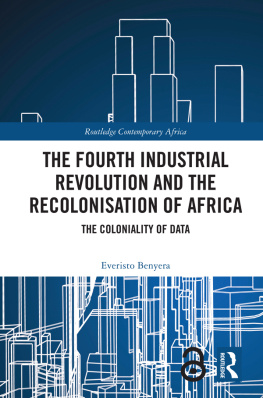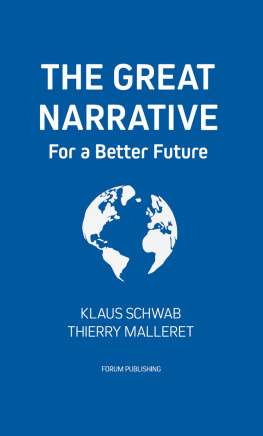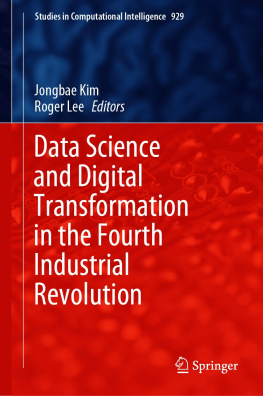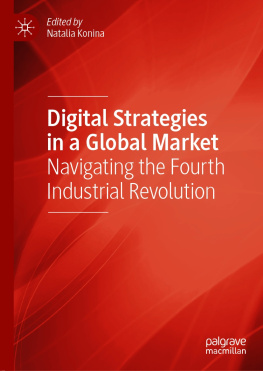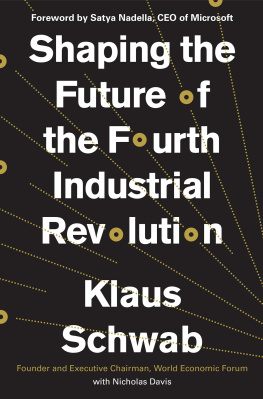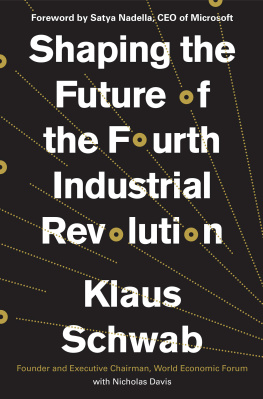
World Economic Forum
2016 All rights reserved.
All rights reserved. No part of this publication may be reproduced, stored in a retrieval system, or transmitted, in any form or by any means, electronic, mechanical, photocopying, or otherwise without the prior permission of the World Economic Forum.
ISBN-13: 978-1-944835-01-9
ISBN-10: 1944835016
REF: 231215
World Economic Forum
9193 route de la Capite
CH-1223 Cologny/Geneva
Switzerland
www.weforum.org
Contents
Introduction
Of the many diverse and fascinating challenges we face today, the most intense and important is how to understand and shape the new technology revolution, which entails nothing less than a transformation of humankind. We are at the beginning of a revolution that is fundamentally changing the way we live, work, and relate to one another. In its scale, scope and complexity, what I consider to be the fourth industrial revolution is unlike anything humankind has experienced before.
We have yet to grasp fully the speed and breadth of this new revolution. Consider the unlimited possibilities of having billions of people connected by mobile devices, giving rise to unprecedented processing power, storage capabilities and knowledge access. Or think about the staggering confluence of emerging technology breakthroughs, covering wide-ranging fields such as artificial intelligence (AI), robotics, the internet of things (IoT), autonomous vehicles, 3D printing, nanotechnology, biotechnology, materials science, energy storage and quantum computing, to name a few. Many of these innovations are in their infancy, but they are already reaching an inflection point in their development as they build on and amplify each other in a fusion of technologies across the physical, digital and biological worlds.
We are witnessing profound shifts across all industries, marked by the emergence of new business models, the disruption of incumbents and the reshaping of production, consumption, transportation and delivery systems. On the societal front, a paradigm shift is underway in how we work and communicate, as well as how we express, inform and entertain ourselves. Equally, governments and institutions are being reshaped, as are systems of education, healthcare and transportation, among many others. New ways of using technology to change behaviour and our systems of production and consumption also offer the potential for supporting the regeneration and preservation of natural environments, rather than creating hidden costs in the form of externalities.
The changes are historic in terms of their size, speed and scope.
While the profound uncertainty surrounding the development and adoption of emerging technologies means that we do not yet know how the transformations driven by this industrial revolution will unfold, their complexity and interconnectedness across sectors imply that all stakeholders of global society governments, business, academia, and civil society have a responsibility to work together to better understand the emerging trends.
Shared understanding is particularly critical if we are to shape a collective future that reflects common objectives and values. We must have a comprehensive and globally shared view of how technology is changing our lives and those of future generations, and how it is reshaping the economic, social, cultural and human context in which we live.
The changes are so profound that, from the perspective of human history, there has never been a time of greater promise or potential peril. My concern, however, is that decision-makers are too often caught in traditional, linear (and non-disruptive) thinking or too absorbed by immediate concerns to think strategically about the forces of disruption and innovation shaping our future.
I am well aware that some academics and professionals consider the developments that I am looking at as simply a part of the third industrial revolution. Three reasons, however, underpin my conviction that a fourth and distinct revolution is underway:
Velocity : Contrary to the previous industrial revolutions, this one is evolving at an exponential rather than linear pace. This is the result of the multifaceted, deeply interconnected world we live in and the fact that new technology begets newer and ever more capable technology.
Breadth and depth : It builds on the digital revolution and combines multiple technologies that are leading to unprecedented paradigm shifts in the economy, business, society, and individually. It is not only changing the what and the how of doing things but also who we are.
Systems Impact: It involves the transformation of entire systems, across (and within) countries, companies, industries and society as a whole.
In writing this book, my intention is to provide a primer on the fourth industrial revolution - what it is, what it will bring, how it will impact us, and what can be done to harness it for the common good. This volume is intended for all those with an interest in our future who are committed to using the opportunities of this revolutionary change to make the world a better place.
I have three main goals:
to increase awareness of the comprehensiveness and speed of the technological revolution and its multifaceted impact,
to create a framework for thinking about the technological revolution that outlines the core issues and highlights possible responses, and
to provide a platform from which to inspire public-private cooperation and partnerships on issues related to the technological revolution.
Above all, this book aims to emphasize the way in which technology and society co-exist. Technology is not an exogenous force over which we have no control. We are not constrained by a binary choice between accept and live with it and reject and live without it. Instead, take dramatic technological change as an invitation to reflect about who we are and how we see the world. The more we think about how to harness the technology revolution, the more we will examine ourselves and the underlying social models that these technologies embody and enable, and the more we will have an opportunity to shape the revolution in a manner that improves the state of the world.
Shaping the fourth industrial revolution to ensure that it is empowering and human-centred, rather than divisive and dehumanizing, is not a task for any single stakeholder or sector or for any one region, industry or culture. The fundamental and global nature of this revolution means it will affect and be influenced by all countries, economies, sectors and people. It is, therefore, critical that we invest attention and energy in multistakeholder cooperation across academic, social, political, national and industry boundaries. These interactions and collaborations are needed to create positive, common and hope-filled narratives, enabling individuals and groups from all parts of the world to participate in, and benefit from, the ongoing transformations.
Much of the information and my own analysis in this book are based on ongoing projects and initiatives of the World Economic Forum and has been developed, discussed and challenged at recent Forum gatherings. Thus, this book also provides a framework for shaping the future activities of the World Economic Forum. I have also drawn from numerous conversations I have had with business, government and civil society leaders, as well as technology pioneers and young people. It is, in that sense, a crowd-sourced book, the product of the collective enlightened wisdom of the Forums communities.
This book is organized in three chapters. The first is an overview of the fourth industrial revolution. The second presents the main transformative technologies. The third provides a deep dive into the impact of the revolution and some of the policy challenges it poses. I conclude by suggesting practical ideas and solutions on how best to adapt, shape and harness the potential of this great transformation.
Next page
